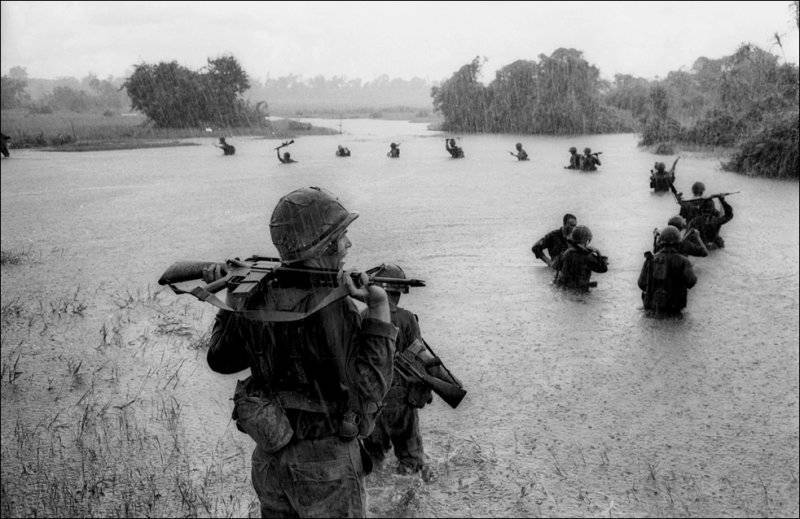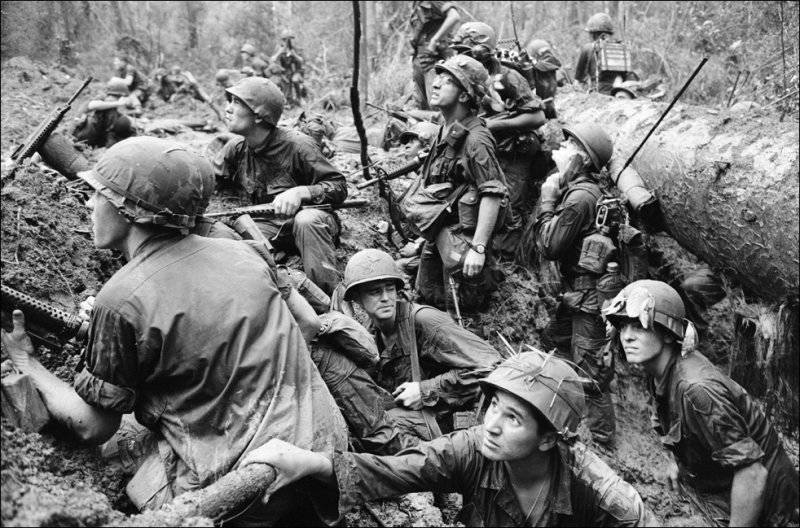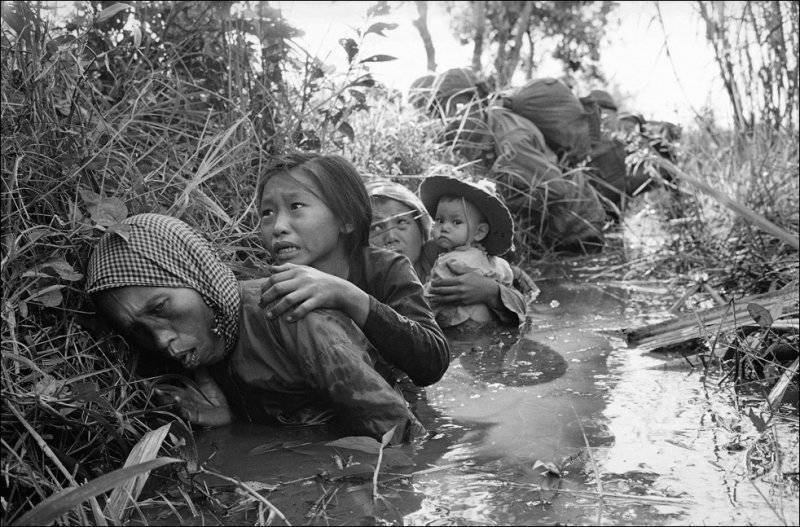"I just tremble for my country when I think that God is just" -
US President Thomas Jefferson
In the second half of the 19th century, Vietnam became a French colony. The growth of national consciousness after the First World War led to the creation in 1941 in China of the League for the Independence of Vietnam or Viet Minh - a military-political organization that united all opponents of French power.
The main positions were occupied by supporters of communist views under the leadership of Ho Chi Minh. During the Second World War, he actively cooperated with the United States, which helped the Viet Minh with weapons and ammunition to fight the Japanese. After the surrender of Japan, Ho Chi Minh captured Hanoi and other major cities of the country, proclaiming the formation of an independent Democratic Republic of Vietnam. However, France did not agree with this and transferred an expeditionary force to Indochina, starting a colonial war in December 1946. The French army could not cope with the partisans alone, and since 1950 the United States came to their aid. The main reason for their intervention was the strategic importance of the region, guarding the Japanese islands and the Philippines from the southwest. The Americans considered that it would be easier to control these territories if they were under the rule of the French allies.
The war went on for the next four years and by 1954, after the defeat of the French at the Battle of Dien Bien Phu, the situation became almost hopeless. The United States by this time already paid more than 80% of the costs of this war. Vice President Richard Nixon recommended tactical nuclear bombing. But in July 1954, the Geneva Agreement was concluded, according to which the territory of Vietnam was temporarily divided along the 17th parallel (where there was a demilitarized zone) into North Vietnam (under the control of the Viet Minh) and South Vietnam (under the rule of the French, who almost immediately granted her independence ).
In 1960, John F. Kennedy and Richard Nixon fought for the White House in the United States. At that time, the fight against communism was considered good form, and therefore the winner was the applicant whose program to combat the "red threat" was more decisive. After the adoption of communism in China, the US government viewed any developments in Vietnam as part of communist expansion. This could not be allowed, and therefore, after the Geneva Accords, the United States decided to completely replace France in Vietnam. With American support, South Vietnamese Prime Minister Ngo Dinh Diem proclaimed himself the first President of the Republic of Vietnam. His rule was tyranny in one of its worst forms. Only relatives were appointed to government positions, whom the people hated even more than the president himself. Those who opposed the regime were locked up in prisons, and freedom of speech was forbidden. It was hardly to the liking of America, but you can’t turn a blind eye to anything, for the sake of the only ally in Vietnam.
As one US diplomat said, "Ngo Dinh Diem is certainly a son of a bitch, but he is OUR son of a bitch!"
The appearance on the territory of South Vietnam of underground resistance groups, not even supported from the North, was only a matter of time. However, the United States saw only the intrigues of the Communists in everything. Further tightening of measures only led to the fact that in December 1960, all South Vietnamese underground groups united in the National Liberation Front of South Vietnam, called the Viet Cong in the West. Now North Vietnam began to support the partisans. In response, the US stepped up its military aid to Diem. In December 1961, the first regular units of the US Armed Forces arrived in the country - two helicopter companies, designed to increase the mobility of government troops. American advisers trained South Vietnamese soldiers and planned combat operations. The John F. Kennedy administration wanted to demonstrate to Khrushchev its determination to destroy the "communist contagion" and its readiness to defend its allies. The conflict grew and soon became one of the most "hot" hotbeds of the Cold War between the two powers. For the US, the loss of South Vietnam meant the loss of Laos, Thailand, and Cambodia, which posed a threat to Australia. When it became clear that Diem was not capable of effectively fighting the partisans, the American intelligence services, through the hands of South Vietnamese generals, organized a coup. On November 2, 1963, Ngo Dinh Diem was killed along with his brother. Over the next two years, as a result of the struggle for power, another coup took place every few months, which allowed the partisans to expand the captured territories. At the same time, US President John F. Kennedy was assassinated, and many fans of the "conspiracy theory" see this as his desire to end the Vietnam War peacefully, which someone really did not like. This version is plausible, in light of the fact that the first document that Lyndon Johnson signed as new president was to send additional troops to Vietnam. Although on the eve of the presidential elections, he was nominated as a "candidate for the world", which influenced his landslide victory. The number of American soldiers in South Vietnam rose from 760 in 1959 to 23,300 in 1964.

On August 2, 1964, in the Gulf of Tonkin, two American destroyers, Maddox and Turner Joy, were attacked by North Vietnamese forces. A couple of days later, in the midst of confusion in the command of the Yankees, the destroyer Maddox announced a second shelling. And although the crew of the ship soon denied the information, intelligence announced the interception of messages in which the North Vietnamese confessed to the attack. The US Congress, with 466 votes in favor and no votes against, passed the Tonkin Resolution, giving the President the right to respond to this attack by any means. This started the war. Lyndon Johnson ordered airstrikes against North Vietnamese naval installations (Operation Pierce Arrow). Surprisingly, the decision to invade Vietnam was made only by the civilian leadership: Congress, President, Secretary of Defense Robert McNamara, and Secretary of State Dean Rusk. The Pentagon reacted without enthusiasm to the decision to "settle the conflict" in Southeast Asia.
Colin Powell, then a young officer, said: "Our military was afraid to tell the civilian leadership that this method of war leads to a guaranteed loss."
The American analyst Michael Desh wrote: "The unconditional obedience of the military to civilian authorities leads, firstly, to the loss of their authority, and secondly, it unties the hands of official Washington for further, similar to the Vietnamese, adventures."
More recently, the United States released a statement by independent researcher Matthew Aid, who specializes in the National Security Agency (US special service of electronic intelligence and counterintelligence), that key intelligence about the incident in the Gulf of Tonkin in 1964, which served as the reason for the US invasion of Vietnam, was falsified . The basis was a 2001 report by NSA staff historian Robert Heynock, declassified under the Freedom of Information Act (passed by Congress in 1966). The report shows that the NSA officers made an unintentional error in translating the information received as a result of radio interception. Senior officers, who almost immediately revealed the mistake, decided to hide it by correcting all the necessary documents so that they indicated the reality of the attack on the Americans. High-ranking officials repeatedly referred to these false data in their speeches.

Robert McNamara, stated: “I think it is wrong to think that Johnson wanted war. However, we believed that we had evidence that North Vietnam was going to escalate the conflict.
And this is not the latest falsification of intelligence by the leadership of the NSA. The war in Iraq was based on unconfirmed information on the "uranium dossier". However, many historians believe that even if there had been no incident in the Gulf of Tonkin, the United States would still have found a reason to start military operations. Lyndon Johnson believed that America must defend its honor, impose a new round of the arms race on our country, unite the nation, distract its citizens from internal problems.
When a new presidential election was held in the United States in 1969, Richard Nixon declared that the foreign policy of the United States would change dramatically. The US will no longer pretend to be the overseer and try to solve problems in all corners of the planet. He revealed a secret plan to end the battles in Vietnam. This was well received by the war-weary American public, and Nixon won the election. However, in reality, the secret plan consisted in the massive use of aviation and navy. In 1970 alone, American bombers dropped more bombs on Vietnam than in the past five years combined.
And here we should mention another side interested in the war - US corporations that manufacture ammunition. In the Vietnam War, more than 14 million tons of explosives were detonated, which is several times more than during the Second World War in all theaters of operations. Bombs, including high-tonnage bombs and now banned fragment bombs, razed entire villages to the ground, and the fire of napalm and phosphorus burned hectares of forest. Dioxin, which is the most toxic substance ever created by man, was sprayed over the territory of Vietnam in an amount of more than 400 kilograms. Chemists believe that 80 grams added to New York's water supply is enough to turn it into a dead city. This weapon has continued to kill for forty years, affecting the current generation of Vietnamese. The profits of US military corporations amounted to many billions of dollars. And they were not at all interested in a quick victory for the American army. After all, it is not by chance that the most developed state in the world, using the latest technologies, large masses of soldiers, winning all their battles, still could not win the war.

Republican presidential candidate Ron Paul said: “We are moving towards a fascism not of the Hitler type, but of a softer type of fascism that is expressed in the loss of civil liberties, when everything is run by corporations and the government is in the same bed with big business.”
In 1967, the International War Crimes Tribunal held two hearings on the conduct of the Vietnam War. It follows from their verdict that the United States bears full responsibility for the use of force and for the crime against peace in violation of the established provisions of international law.
“In front of the huts,” recalls a former US soldier, “old men stood or squatted in the dust at the threshold. Their life was so simple, it was all in this village and the fields surrounding it. What do they think of strangers invading their village? How can they understand the constant movement of helicopters cutting through their blue sky; tanks and half-tracks, armed patrols paddling through their rice paddies where they cultivate the land?

US military Vietnam War
The "Vietnam War" or "Vietnam War" is Vietnam's Second Indochina War with the United States. It began around 1961 and ended on April 30, 1975. In Vietnam itself, this war is called the Liberation War, and sometimes the American War. The Vietnam War is often seen as the peak of the Cold War between the Soviet bloc and China on the one hand, and the US with some of its allies on the other. In America, the Vietnam War is considered its darkest spot. In the history of Vietnam, this war is perhaps the most heroic and tragic page.
The Vietnam War was both a civil war between various political forces in Vietnam and an armed struggle against the American occupation.
ctrl Enter
Noticed osh s bku Highlight text and click Ctrl+Enter
